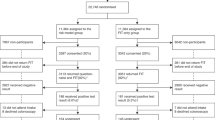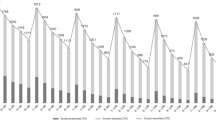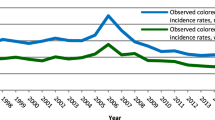Abstract
Background
Faecal immunochemical tests (FITs) yield many false positives and challenge colonoscopy capacity in colorectal cancer (CRC) screening programmes. We aimed to develop a risk-based selection of participants to undergo diagnostic colonoscopy.
Methods
The study was observational and used registry data from the Danish CRC screening programme. We included all participants invited 2014–2016 with a positive FIT (≥ 20 μg fHb/g) who underwent colonoscopy (n = 56,459). We predicted the risk of CRC or advanced neoplasia (AN) from age, gender and FIT value using logistic regression. We evaluated calibration and discrimination and conducted temporal validation. We compared the number of CRCs and adenomas identified by risk cut-offs and by a corresponding FIT cut-off.
Results
AUCs were 74.9% (95% CI: 73.6; 76.3) and 67.4% (95% CI: 66.8%; 68.0%) for the models predicting CRC and AN in the validation dataset. The cut-off of CRC risk calculated from age, gender and FIT value identified 1.03 times (95% CI: 1.02; 1.05) more CRCs and 1.01 times (95% CI: 1.01; 1.01) more medium/high-risk adenomas compared with the corresponding FIT cut-off.
Conclusions
With existing data, risk-stratified FIT screening using a risk cut-off instead of a FIT cut-off can slightly improve the selection to colonoscopy of those at highest risk of cancer and adenomas.
This is a preview of subscription content, access via your institution
Access options
Subscribe to this journal
Receive 24 print issues and online access
$259.00 per year
only $10.79 per issue
Buy this article
- Purchase on Springer Link
- Instant access to full article PDF
Prices may be subject to local taxes which are calculated during checkout


Similar content being viewed by others
Data availability
The data for this study are not publicly available, but access to the data sources can be granted by the Danish Colorectal Cancer Screening database and Statistics Denmark, if certain criteria are fulfilled.
References
Schreuders EH, Ruco A, Rabeneck L, Schoen RE, Sung JJY, Young GP, et al. Colorectal cancer screening: a global overview of existing programmes. Gut. 2015;64:1637–49.
Danish Health Authority. Recommendations regarding screening for colorectal cancer [Danish] [Internet]. 2010. Available from: https://www.sst.dk/-/media/Udgivelser/2012/Publ2012/Anbefalninger-vedrørende-screening-for-tyk--og-endetarmskræft.ashx.
Thomsen MK, Rasmussen M, Njor SH, Mikkelsen EM. Demographic and comorbidity predictors of adherence to diagnostic colonoscopy in the Danish Colorectal Cancer Screening Program: a nationwide cross-sectional study. Clin Epidemiol. 2018;10:1733–42.
Lawler M, Alsina D, Adams RA, Anderson AS, Brown G, Fearnhead NS, et al. Critical research gaps and recommendations to inform research prioritisation for more effective prevention and improved outcomes in colorectal cancer. Gut. 2018;671136:179–93.
Fraser CG. Faecal haemoglobin concentration and personalised assessment of the risk of colorectal neoplasia. J Lab Precis Med. 2017;2:71–71.
Steele RJ, McDonald PJ, Digby J, Brownlee L, Strachan JA, Libby G, et al. Clinical outcomes using a faecal immunochemical test for haemoglobin as a first-line test in a national programme constrained by colonoscopy capacity. U Eur Gastroenterol J. 2013;1:198–205.
Toes-Zoutendijk E, Leerdam ME, van, Dekker E, Hees F, van, Penning C, Nagtegaal I, et al. Real-time monitoring of results during first year of Dutch colorectal cancer screening program and optimization by altering fecal immunochemical test cut-off levels. Gastroenterology. 2017;152:767–775.e2.
Njor SH, Andersen B, Friis-Hansen L, Haas N de, Linnemann D, Nørgaard H, et al. The optimal cut-off value in fit-based colorectal cancer screening: an observational study. Cancer Med. 2021;10:1872–9.
Digby J, Fraser CG, Carey FA, McDonald PJ, Strachan JA, Diament RH, et al. Faecal haemoglobin concentration is related to severity of colorectal neoplasia. J Clin Pathol. 2013; 66:415–9.
Cooper JA, Moss SM, Smith S, Seaman HE, Taylor-Phillips S, Parsons N, et al. FIT for the future: a case for risk-based colorectal cancer screening using the faecal immunochemical test. Color Dis. 2016;18:650–3.
Schreuders EH, Grobbee EJ, Spaander MCW, Kuipers EJ. Advances in fecal tests for colorectal cancer screening. Curr Treat Options Gastroenterol. 2016;14:152–62.
Cooper JA, Parsons N, Stinton C, Mathews C, Smith S, Halloran SP, et al. Risk-adjusted colorectal cancer screening using the FIT and routine screening data: development of a risk prediction model. Br J Cancer. 2018;118:285–93.
Rasmussen M, Andersen ABT, Njor SH, Andersen VD. Danish colorectal cancer screening database, annual report 2017 National Prevalence Screening Round [Danish] [Internet]. København/Århus; 2018 [cited 2019 Jan 15]. Available from: https://www.sundhed.dk/content/cms/45/61245_dts_årsrapport-2017_final.pdf.
Larsen MB, Mikkelsen E, Rasmussen M, Friis-Hansen L, Ovesen A, Rahr HB, et al. Sociodemographic characteristics of nonparticipants in the Danish colorectal cancer screening program: a nationwide cross-sectional study. Clin Epidemiol. 2017;9:345–54.
Nielsen KT. Danish Colorectal Cancer Group’s national guidelines for diagnostics and treatment of colorectal cancer - screening [Danish] [Internet]. [cited 2018 Jun 13]. Available from: https://dccg.dk/wp-content/uploads/2017/08/2014_screening.pdf.
Thomsen MK, Njor SH, Rasmussen M, Linnemann D, Andersen B, Baatrup G, et al. Validity of data in the Danish colorectal cancer screening database. Clin Epidemiol. 2017;9:105.
Ingeholm P, Gögenür I, Iversen L. Danish colorectal cancer group database. Clin Epidemiol. 2016;8:465–8.
Schmidt M, Pedersen L, Sørensen HT. The Danish Civil Registration System as a tool in epidemiology. Eur J Epidemiol. 2014;29:541–9.
Danish Colorectal Cancer Screening Database, Annual report 2016 The first 34 months of the first national screening round [Danish] [Internet]. [cited 2020 Jan 4]. Available from: https://www.sundhed.dk/content/cms/45/61245_dtsårsrapport-2016_offentlig-version.pdf.
Fraser CG, Allison JE, Halloran SP, Young GP. A proposal to standardize reporting units for fecal immunochemical tests for hemoglobin. JNCI J Natl Cancer Inst. 2012;104:810–4.
Gies A, Cuk K, Schrotz-King P, Brenner H. Direct comparison of ten quantitative fecal immunochemical tests for hemoglobin stability in colorectal cancer screening. Clin Transl Gastroenterol. 2018;9:e168.
Moons KGM, Royston P, Vergouwe Y, Grobbee DE, Altman DG. Prognosis and prognostic research: what, why, and how? BMJ. 2009;338:b375.
Royston P, Moons KGM, Altman DG, Vergouwe Y. Prognosis and prognostic research: developing a prognostic model. BMJ. 2009;338:b604.
Altman DG, Vergouwe Y, Royston P, Moons KGM. Prognosis and prognostic research: validating a prognostic model. BMJ. 2009;338:b605.
Collins GS, Reitsma JB, Altman DG, Moons K. Transparent reporting of a multivariable prediction model for individual prognosis or diagnosis (TRIPOD): the TRIPOD statement. BMC Med. 2015;13:1.
Steyerberg EW, Vergouwe Y. Towards better clinical prediction models: seven steps for development and an ABCD for validation. Eur Heart J. 2014;35:1925–31.
Steyerberg EW, Vickers AJ, Cook NR, Gerds T, Gonen M, Obuchowski N, et al. Assessing the performance of prediction models: a framework for some traditional and novel measures. Epidemiology. 2010;21:128–38.
Fraser CG, Allison JE, Young GP, Halloran SP, Seaman HE. Improving the reporting of evaluations of faecal immunochemical tests for haemoglobin: the Fitter standard and checklist. Eur J Cancer Prev Eur J Cancer Prev. 2015;24:24–6.
Collins GS, Groot JA, de, Dutton S, Omar O, Shanyinde M, Tajar A, et al. External validation of multivariable prediction models: a systematic review of methodological conduct and reporting. BMC Med Res Methodol. 2014;14:40.
Stegeman I, Wijkerslooth TR, de Stoop EM, Leerdam ME, van, Dekker E, Ballegooijen Mvan, et al. Combining risk factors with faecal immunochemical test outcome for selecting CRC screenees for colonoscopy. Gut. 2014;63:466–71.
Usher-Smith JA, Walter FM, Emery JD, Win AK, Griffin SJ. Risk prediction models for colorectal cancer: a systematic review. Cancer Prev Res. 2016;9:13–26.
Kortlever TL, Vlugt M, van der, Dekker E, Bossuyt PMM. Individualized faecal immunochemical test cut-off based on age and sex in colorectal cancer screening. Prev Med Rep. 2021;23:101447.
Roos VH, Kallenberg FGJ, Vlugt M, van der, Bongers EJC, Aalfs CM, Bossuyt PMM, et al. Addition of an online, validated family history questionnaire to the Dutch FIT-based screening programme did not improve its diagnostic yield. Br J Cancer. 2020;122:1865–71.
Cooper JA, Ryan R, Parsons N, Stinton C, Marshall T, Taylor-Phillips S. The use of electronic healthcare records for colorectal cancer screening referral decisions and risk prediction model development. BMC Gastroenterol. 2020;20:1–16.
Duran-Sanchon S, Moreno L, Gómez-Matas J, Augé JM, Serra-Burriel M, Cuatrecasas M, et al. Fecal microRNA-based algorithm increases effectiveness of fecal immunochemical test-based screening for colorectal cancer. Clin Gastroenterol Hepatol. 2021;19:323–330.e1.
Acknowledgements
We wish to thank Research Professor A. Cecile J.W. Janssens, Department of Epidemiology, Emory University, for initial advice and discussions on the conduct of prediction studies. We also thank colleagues Anne-Sofie Dam Laursen, Mette Lauge Kristensen and Carl Felix Jan Wittstrom for their valuable input on the presentation of results. Data on screening participants were kindly provided by the Danish Colorectal Cancer Screening database.
Funding
The study received funding from the Danish Cancer Society, Danish Health foundation, King Christian X Foundation, Inge and Jørgen Larsens Memorial Trust and, Else and Mogens Wedell-Wedellsborgs Foundation.
Author information
Authors and Affiliations
Contributions
The idea for the study was developed by MKT and further specified by MKT and EMM. MKT, RE, LP, HTS, TLL and EMM designed the study and protocol. MKT conducted the statistical analysis and LP and EMM were involved in developing the methodology. MKT and EMM drafted the manuscript. All authors contributed to the manuscript through critical revision of drafts and approved the final manuscript.
Corresponding author
Ethics declarations
Competing interests
The authors declare no competing interests. Department of Clinical Epidemiology, Aarhus University, is involved in studies with institutional funding from regulators and from various pharmaceutical companies, as research grants to and administered by Aarhus University. None of these studies is related to this study.
Ethics approval and consent to participate
The registry data used in this study was made available to us in an anonymized form at the servers of Statistics Denmark. The study was included in the Danish Data Protection Agency data approval administered by Aarhus University (j. no. 2016-051-000001, 1193). Studies using registry data in Denmark do not require specific consent and does not require approval by a research ethics committee.
Consent to publish
This paper does not contain any individual-level data.
Additional information
Publisher’s note Springer Nature remains neutral with regard to jurisdictional claims in published maps and institutional affiliations.
Rights and permissions
About this article
Cite this article
Thomsen, M.K., Pedersen, L., Erichsen, R. et al. Risk-stratified selection to colonoscopy in FIT colorectal cancer screening: development and temporal validation of a prediction model. Br J Cancer 126, 1229–1235 (2022). https://doi.org/10.1038/s41416-022-01709-6
Received:
Revised:
Accepted:
Published:
Issue Date:
DOI: https://doi.org/10.1038/s41416-022-01709-6



